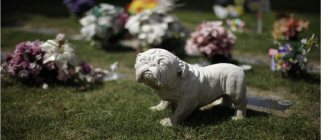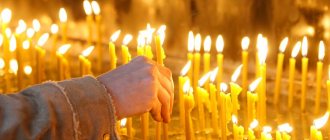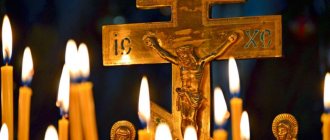The rite of baptism is the first step of a Christian into Orthodox life. This event ensures a transition from a sinful life to a righteous one, and it can be carried out in infancy or in a mature, conscious age. But what to do if the deceased was not baptized during his lifetime? What kind of funerals are held for an unbaptized person, and is it possible to perform Orthodox rites for him? The Eden ritual agency in Dnepr will tell you about all the intricacies of the ritual rite of funeral of an unbaptized person.
The sacrament of baptism in Orthodoxy
The ritual of baptism in the Christian world allows a person to be reincarnated and leave a sinful life for a spiritual one. Entering God's House, a person acquires a new name, under which he is spiritually born. Baptism is not just a rite or procedure, it is a Sacrament in which the connection with God is strengthened, a person’s faith increases, giving hope for the remission of sins after death.
The sacrament of baptism is performed in the Orthodox Church, sometimes at home. Often, parents themselves make the decision for the child and carry out his baptism in infancy. A person’s decision to remain unbaptized is considered a renunciation of Orthodoxy, but such a choice is not sinful. It’s just that after death a person cannot count on the mercy of the Lord, and there will be no place for him in his Kingdom. The Orthodox Church does not accept the unbaptized, and treats them specially after death.
The meaning of a church funeral for the soul of a baptized person after death
The funeral service or burial ceremony is carried out once. This is one of the differences between such a service and a memorial service, since these concepts are often considered synonymous with one action. Their meaning is, indeed, similar. However, the funeral service is performed many times over one person at different times. The purpose of the funeral service is the intercession of the clergyman before the Lord for the forgiveness of the sins of the deceased. The soul lets go of everything earthly and prepares for the meeting with the Heavenly Father. She appears before his throne, humble, purified.
For a baptized person, this is an important stage, because even after performing such a ritual, he remains a sinner, although he changes his aspirations, thoughts, and actions. Only Jesus was infallible. The righteous person, although to a lesser extent, commits inappropriate acts, therefore, carrying out the rite of burial after death is one of the important stages for him. Thanks to him, partial cleansing from sins occurs.
For the soul of a baptized person, a funeral without a funeral service is a difficult ordeal, but this is only possible in rare cases.
Is it possible to perform a funeral service for an unbaptized deceased?
Death is an integral part of life, when the soul goes to another world for eternal life. Many people are interested in whether an unbaptized or unbelieving person can go to the spiritual world after death? Definitely not. And that is why the unbaptized are not buried in church, memorial services are not ordered for them, and candles are not lit. You can find out the importance of the funeral service for the deceased and how the ritual is performed here .
In this case, the relatives of the unbaptized deceased need to understand that the church has nothing against such people, there is simply a ban on funeral services for those who have not undergone the sacrament of baptism, or have somehow been renounced by the church. A person’s soul that has not been baptized does not receive the opportunity for its salvation after the death of its mortal body, which means it is forced to eternally wander between worlds, without finding refuge.
Who doesn't have a funeral service in church?
Representatives of some categories of the population are not given the funeral rites (funeral service). This is due to various reasons, but in most cases the key factor noted is a serious violation of religious canons. A person who treats the established holy order without respect, violates it in the most rude manner, will miss the number of those who can be buried after death.
Cross and candles in the church
Suicides
One of the greatest sins is to take your own life. The Church condemns such an act and excludes the person from membership of the Church. These people are deprived of the right to be mentioned even in prayer texts during a memorial service. But there are some exceptions to this rule:
- it is possible to conduct a funeral if the person had mental disabilities when he committed the sin;
- suicide occurred not on the initiative of the deceased, but as a result of the use of psychotropic substances, while consciousness was clouded at the time of committing a grave sin;
- death occurred as a result of careless actions (if products containing toxic substances were consumed, etc.);
- there was a fact of self-sacrifice, the believer gave his life for another when the latter needed it.
Gentiles
Representatives of other faiths cannot claim a place among the members of the Orthodox Church as long as they represent a different branch of religion. But Baptists, Catholics, Jews, and Muslims can turn to the ministers of their own church, where they can receive instructions regarding the possibility of performing the rite of burial when the time comes. Among some nationalities (for example, the Chuvash) there are many people of other faiths, and there are also atheists. But everyone decides for themselves which path they will choose for themselves.
Unbaptized babies
More recently, infants who did not have time to undergo the rite of baptism were not given funeral services after death. This group includes stillborns, as well as those who lived only a few hours. In Yekaterinburg, at the Holy Synod, it was decided to change this rule. The newborn is now supported through a service of comfort and love.
Previously, funeral services for infants were not held in Russia due to the absence of sins in a small child. This made it difficult to resolve the question of how to conduct the burial rite, if such a rite was originally aimed at gaining mercy from the Lord when a person had sins.
Criminals
It is generally accepted that criminal acts result in excommunication from the church. This means a refusal to conduct a funeral service and the inability to use religious attributes during burial. But this rule is outdated. Long ago, the highest ranks of the church decided to establish new traditions. It became possible to hold funeral services for criminals who repented, and did so sincerely. When the body goes to the grave, the soul gets a chance for forgiveness of sins.
But for this it is necessary to make attempts at complete or partial change during life: to show mercy, to help the weak, to go to confession, to receive communion, etc.
Candles for the repose of the soul
What is the difference between the funeral of a baptized and an unbaptized person?
Christian canons say that the soul goes through a long and difficult path to atone for worldly sins and a new rebirth. The deceased person is washed, buried and a memorial service is held to help him pass this difficult path. Candles and lamps are lit for the deceased, and prayers are offered for the remission of sins. After the burial ceremony, a wake is required on 9 and 40 days after death, as well as on the anniversary. Relatives observe strict mourning for forty days after the death of a person, and through their actions help the deceased to be cleansed of sins and not be afraid of the Last Judgment.
The soul of an unbaptized person is deprived of the opportunity to ascend to Paradise after death. It is prohibited to pray in church for such deceased people, and relatives are only allowed to read special prayers as a sign of grief and love for the deceased.
The funeral of an unbaptized person is held without Orthodox paraphernalia and a priest. You can buy any type of coffin for the deceased, but there is no cross nailed to the lid, and the product itself does not have any Orthodox symbols. A funeral set is not purchased along with ritual goods, and instead of a cross, a wooden plank with a plaque is installed on the grave.
Deceased infants who did not have time to undergo the sacrament of baptism are buried without a funeral service or wake. The souls of babies are already pure, and they will not have to go through all the difficulties in the afterlife and fear God’s judgment.
Why is it impossible and impossible to perform a funeral service for an unbaptized person?
An unbaptized person is a person who has not undergone the Sacrament of Baptism during his lifetime. This could be consciously or unconsciously, that is, the result of one’s own choice or a consequence of the lack of information, its distortion by the person’s environment or the influence of other reasons. However, the factor that played a key role in this is not as important as the outcome itself - in both cases there is no opportunity to hold a funeral service.
Funeral service for the deceased
This is a fairly strict prohibition of the church, based on Christian canons. It is explained by the fact that during his lifetime a person did not take the initiative to draw closer to the Lord, and often people even consciously come to such a choice. This means that after death the soul will not be able to undergo the funeral ceremony.
The basis for such a ban is the inability to perform the Sacrament of baptism when a person is deprived of his physical shell. This means that we can talk about a simultaneous ban on holding the ceremony and the absence of conditions for this.
Many people cannot understand why this happens, because the Lord is merciful and must accept into his House everyone who wants to enter it. But the difficulty lies precisely in the fact that during his lifetime man did not express such a desire; he sinned, renounced God, and denied his power over all things. It must also be taken into account that the soul can do little after death. Repentance is the lot of the living. When a person dies, he does not have the opportunity to be cleansed of sins, because for this it is not enough to say a prayer without faith. It is required to perform actions confirming external changes:
- show mercy;
- give alms;
- help those in need;
- give protection to the weak;
- You can’t use foul language or anger or break the commandments.
Funeral service for the deceased
It is quite possible to overcome all obstacles on the path to God, to be cleansed in a short time, skipping the stage of ordeal. However, only rare people can do this, those who have enough internal strength to overcome difficult trials, thanks to which drastic changes occur. Such a person can become enlightened in one hour/day, but such a result is obtained only by those who are ready to accept severe mental pain, humiliation, and loss. For most, it takes a lifetime to repent. This means that the likelihood that an unbaptized person will be able to change before death is small. Accordingly, the rite of burial over him according to Orthodox canons will not be carried out.
There is no Christian paraphernalia (cross, etc.) on the grave of an unbaptized person, no funeral service is performed over him, and it is forbidden to hold a funeral in a church cemetery.
It is equally important to understand that the church’s refusal to perform funeral services for the unbaptized is not a form of revenge. Such people do not become disgusting to the Lord. This is also not a punishment for the fact that a person has not joined the traditions of Orthodoxy. Such thoughts often arise in response to the refusal to perform a funeral service for an unbaptized person. A believer is unlikely to have such a desire, since he has an understanding of the fundamentals of religion. He knows that malice, anger, revenge - these feelings and actions cannot come from a Christian. But still, the funeral of an unbaptized person is still held, only without the use of religious attributes.
Prayer for someone who has not been baptized by the Lord - is it worth doing?
Many relatives consider it their duty to atone for the sins of the deceased from God. But is it worth doing this if the deceased was not baptized? Many people ask this question, and here is what the church says:
- If the deceased was not a believer, does his soul really need prayer and remission of sins? The reluctance to become part of the spiritual world is expressed precisely in the renunciation of Christianity, and in this case it is pointless to violate the will of a person.
- The Lord will not be angry with someone who was not baptized during his lifetime. You need to understand that only those who have entrusted their souls to him voluntarily are under the protection of God. And there is no point in begging for the forgiveness of an unbaptized soul from God, since the soul itself does not belong to him.
- Relatives can read prayers for unbaptized Uaru, which will only help alleviate sins committed during life.
- A person who has renounced his faith is not considered a Christian and cannot count on God's mercy.
The Kingdom of God is not an actual place where endless happiness and grace reigns. This is a figurative expression in which the soul of the deceased unites with God and other righteous people. If the deceased during his lifetime did not express a desire to join this spiritual world, his will must be respected, and rituals that are alien to him should not be imposed.
How to help the soul of an unbaptized person to rest
For unbaptized people who died without a funeral service, notes cannot be submitted or prayers offered at the Divine Liturgy, since they were not members of the Church. Orthodox Christians can ask the Lord for mercy for the departed at home prayers in front of icons.
If a person during his lifetime led a decent lifestyle that corresponds to holy scripture, God will not leave him. Relatives can only leave the further posthumous fate of the deceased to be decided by God. Prayers for people who died without Baptism can be offered at any time of the day.
Farewell ceremony and organization of burial of the unbaptized
Unbaptized people are inveterate atheists who deny the existence of higher powers and do not entrust their souls to God. And therefore, any Orthodox rituals for the deceased are absolutely meaningless. The soul of a person who does not recognize the Orthodox faith does not need these rituals, and does not seek salvation in what it does not believe in.
Funerals of atheists are carried out according to a civil scenario:
- Washing and changing into clean burial clothes.
- Absence of any religious symbolism.
- There is no funeral service, church candles are not lit.
- You can order a brass band for a ceremonial send-off.
- Instead of an icon, a portrait of the deceased is carried in front of the coffin.
- Mourning and memorial services are held at the discretion of relatives.
Most often, unbaptized elderly people decide for themselves how to bury them correctly. Wishes are expressed to relatives regarding the burial scenario, and a will is written. Requests of the deceased are carried out at the discretion of relatives, but as a rule, the wishes of the deceased must be implemented.
Among atheists and unbaptized people, the cremation procedure is especially common, which can be carried out without Orthodox paraphernalia and rituals. You can learn more about cremation and get answers to all your questions here .
Question and answer
What to do if it is not known whether the deceased was baptized in Orthodoxy or not?
It is imperative to clarify whether a person received holy baptism during his lifetime: ask older relatives, check in church archives. If there is no information, it is better to proceed as when burying unbaptized people: bury with civil rites, pray for the deceased privately, and include them in memorial notes only indirectly.
If the deceased was an atheist and a convinced materialist, believed that after life there is only darkness and emptiness, can believing relatives still pray for him?
It is better to resolve this issue individually, on the advice of a clergyman.
What can and cannot be put in the coffin of an unbaptized person?
In this case, the rules for the baptized and unbaptized are the same. It is prohibited to place in the coffin of the deceased:
- Photos of living people.
- Personal belongings of friends and relatives.
- You cannot dress a deceased person in the clothes of living relatives. If it is not possible to buy clothes for the deceased, you can order funeral attire from a funeral agency.
- It is not recommended to bury a deceased person with fresh flowers inside the coffin.
- Place icons, crosses and other Orthodox paraphernalia.
Only his personal belongings and those objects that were dear to him can be placed in the coffin of the deceased. These include: a comb, a watch, a handkerchief, a favorite book. If cremation is to take place, placing metal objects in the coffin is prohibited.
How to bury an unbaptized baby according to church canons
Parents are allowed to carry out a traditional burial of babies (as for adults), if they have lived in the world for some time (minutes, hours, days). Stillborns are buried by the clinic staff because they are not considered spiritual. Today, a funeral service for such children is being held, for which a special rite of burial for infants is provided.
Considering that newborns are sinless, there is no point in praying for repentance. In this case, the children will still receive the protection of angels, but will not suffer the fate of many who receive God's punishment.
What prayers need to be read about the soul of the sinless
People at birth are distinguished by the stamp of original sin. But in some cases it loses its power. This happens during baptism. Those children who died before the ceremony was performed cannot be on the same level as the baptized. For this reason, relatives should pray for such children, ask the Lord to have mercy on them and protect them. Consider different prayer texts for this purpose.
Reading prayers for the deceased
What monument should be installed on the grave of an unbaptized person?
The arrangement of the grave of the deceased is the tribute that the relatives of the deceased must pay. The main attribute on the grave of an Orthodox person is a cross, which is engraved on the gravestone and indicates belonging to the faith.
When burying an unbaptized person, a cross is not placed on the grave, and when choosing a monument, engraving of icons, crosses, or burning candles is not ordered. The only exception can be cross monuments, which can be placed on the graves of atheists and the unbaptized.
As a rule, monuments of a standard, classical type with a stele and a tombstone are ordered for unbaptized deceased people. Engravings of plants or animals and landscapes are chosen as decoration.
Marble vases in which fresh or artificial flowers can be placed would also be appropriate for the grave. Marble vases are presented in a wide variety at the funeral home in the “ritual paraphernalia” category, where you can choose the optimal color and size of the product. You can order a monument for your grave from our agency at the specified addresses. Our qualified managers are ready to help in choosing a tombstone and decoration for an unbaptized person.
How to perform a funeral service for a deceased person whose baptism is in doubt
Most often, if there is no certainty regarding a person’s membership in the church, a funeral service is excluded. This is explained by the fact that he had to attend church at least sometimes. It is enough to check personally whether such a person was present at the services where he lives in order to assess the situation.
Anyone who did not attend church, being baptized, probably did not associate himself with it, which means there is no need to forcibly introduce the soul of such a person to holy rituals.
Is it possible to have a funeral service in absentia after the fact of baptism has been clarified?
Questions regarding the funeral service in absentia are resolved on an individual basis. This is due to the need to assess the situation: it is important to understand why there are no witnesses to the fact of the baptism of the deceased; you need to find out whether the deceased wanted to join the church, even if he had not appeared here for many years. The clergyman makes a decision after weighing all the factors.
A lit candle in memory of the deceased
You can only pray for the unbaptized at home, but not in church
If a person is not baptized, then prayer in church will not affect his fate in any way.
Metropolitan Macarius (Bulgakov) wrote:
“Our prayers can act directly on the souls of the deceased,
if only they died in the right faith and with true repentance,
those. in communion with the Church and with the Lord Jesus:
because in this case,
despite the apparent distance from us,
they continue to belong with us to the same body of Christ.”
Macarius (Bulgakov)
metropolitan
St. Augustine is even more categorical:
“There should not be any doubt that the prayers of St. Churches, saving sacrifices and alms benefit the dead, but only those who lived before death in such a way that after death all this could be useful to them.
For those who have departed without faith, promoted by love, and without communion in the sacraments, the works of that piety performed by their neighbors in vain,
which guarantee they did not have in themselves when they were here, not accepting or accepting in vain the grace of God and hoarding for themselves not mercy, but wrath.
So, they do not acquire new merits for the dead when those they know do something good for them, but only draw consequences from the principles they previously laid down.”
St. Augustine
theologian
And yet you can pray for an unbaptized person, but not in church. It is acceptable for relatives to read prayers at home and light candles, but no more. No proskomedia, memorial services, etc.
New Martyr Athanasius (Sakharov), Bishop of Kovrov, in his work “On the Commemoration of the Dead According to the Charter of the Orthodox Church” writes:
“At home prayer, with the blessing of the spiritual father, even those who
who should not be remembered at a church service.”
“Remembrance of the departed, out of humility and for obedience to the Holy Church,
transferred to our home cell prayer,
will be more valuable in the eyes of God and more joyful for the departed,
than what was done in the temple,
but with violation and disregard of the Church statutes.”
Afanasy (Sakharov)
bishop
At the same time, there is no unanimity in Orthodoxy as to whether it is possible to remember the dead with some kind of church prayer. For example, the Venerable Elder Leo of Optina proposed the following:
“Seek, O Lord, the lost soul of my father: if it is possible, have mercy. Your destinies are unsearchable. Do not make this my prayer a sin, but Thy holy will be done.”
Today they often offer to pray for the unbaptized martyr Uara. This causes a lot of controversy. In Christian circles there are both supporters and critics of this idea. Perhaps in the future the church will form a clearer position.
This prayer is worth seeking a blessing from a priest. If he blesses you, feel free to read it. But the martyr Uara is not recommended to pray for the deceased without a blessing. It’s better to come up with your own prayer then.
They pray to the Martyr Uar for the unbaptized, but only at home, it is prohibited in the temple
Troparion, tone 4:
Through the army of the saints, the passion-bearer who suffered legally, in vain, you showed your strength courageously. And having rushed to the passion of your will, and to die lustfully for Christ, who have accepted the honor of the victory of your suffering, Ouare, pray for our souls to be saved.
Kontakion, tone 4:
Having followed Christ, the martyr Uare, having drunk His cup, and having been bound with the crown of torment, and rejoicing with the Angels, pray unceasingly for our souls
Prayer:
Oh, venerable holy martyr Uare, we inflame with zeal for the Lord Christ,
You confessed the Heavenly King before the tormentor,
and you suffered zealously for Him, and now stand before Him with the angels,
and rejoice in the highest, and see clearly the Holy Trinity,
and enjoy the light of the Beginning Radiance,
remember also our relatives’ yearning,
those who died in wickedness, accept our petition,
and like Cleopatra, you freed the unfaithful race from eternal torment with your prayers,
So remember the trees buried against God,
those who died unbaptized,
trying to ask for deliverance from eternal darkness,
Let us all praise the Most Merciful Creator with one mouth and one heart forever and ever. Amen.
Which saints to pray for an unbaptized relative
The most famous intercessor for the souls of the unbaptized is Saint Uar, who lived in the 3rd-4th century. He served in the Roman imperial army, successfully commanding a large unit of warriors.
Once he secretly converted to Christianity at a time when there was active persecution for the faith. Then he sneaked over to the prisoners who were being tortured and forced to renounce their religion (they were religious teachers), and prayed for them. And then one of the preachers died from torture, and Uar decided that it was his time to suffer for his faith. Then the emperor found out about his faith in Christ, and imprisoned him in prison for torture. Uar did not renounce his faith and died.
The wife of one military leader took his body away and buried him in her family tomb. Uar's grave became a healing place. Her relatives (the woman's name was Cleopatra) were unbaptized and in a revelation the woman asked him to pray for the souls of her ancestors before God. Since then, Uar became intercessors. They pray to him outside the church for souls who did not undergo baptism in Christianity during their lifetime.
Priest's comment
Father Vladimir
Clergyman
The funeral service is performed in absentia for those whose bodies were lost: during a flood, earthquake, etc. When a person is unbaptized, but after his death the physical shell is preserved, then it will not be possible to conduct even an absentee funeral service. None of the forms of this rite are suitable for cases when it is necessary to send on their last journey a person who was not among the faithful members of the Orthodox Church.











